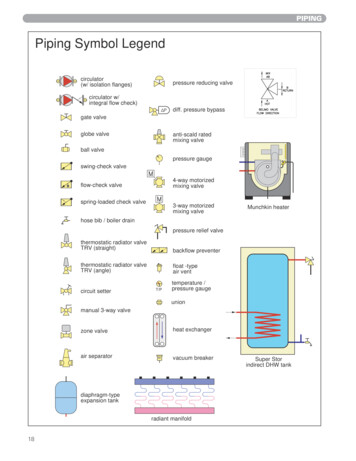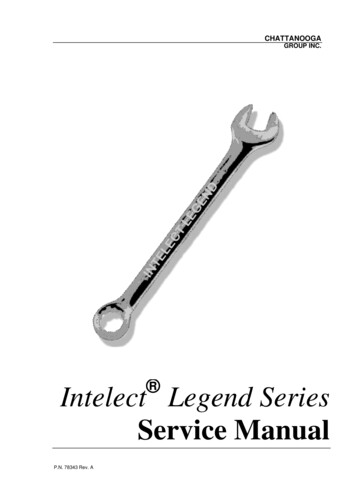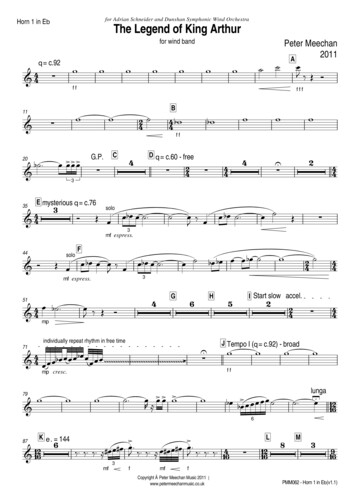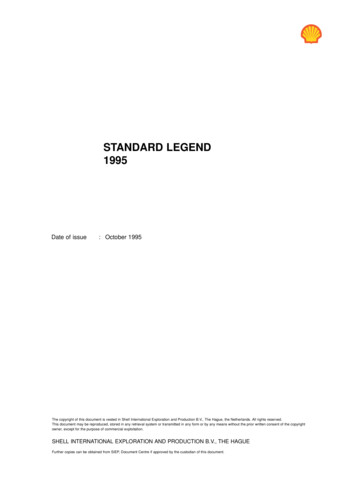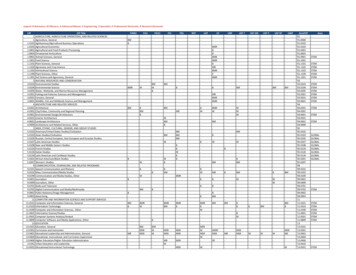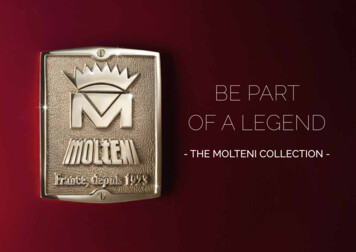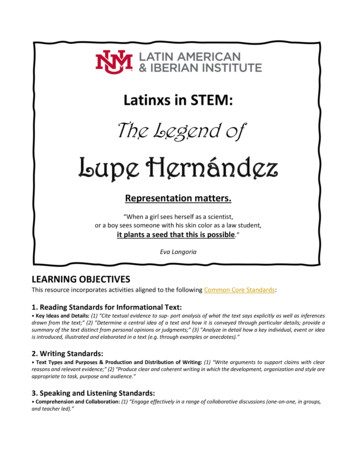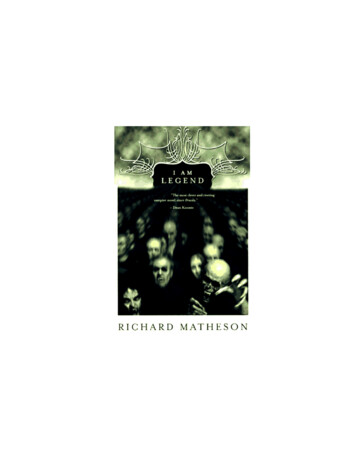
Transcription
RICHARD MATHESONI Am Legend
PART I: January 1976Chapter OneON THOSE CLOUDY DAYS, Robert Neville was never sure when sunset came, andsometimes they were in the streets before he could get back.If he had been more analytical, he might have calculated the approximate time of their arrival;but he still used the lifetime habit of judging nightfall by the sky, and on cloudy days thatmethod didn’t work. That was why he chose to stay near the house on those days.He walked around the house in the dull gray of afternoon, a cigarette dangling from the cornerof his mouth, trailing threadlike smoke over his shoulder. He checked each window to see if anyof the boards had been loosened. After violent attacks, the planks were often split or partiallypried off, and he had to replace them completely; a job he hated. Today only one plank wasloose. Isn’t that amazing? he thought.In the back yard he checked the hothouse and the water tank. Sometimes the structure aroundthe tank might be weakened or its rain catchers bent or broken off. Sometimes they would lobrocks over the high fence around the hothouse, and occasionally they would tear through theoverhead net and he’d have to replace panes.Both the tank and the hothouse were undamaged today. He went to the house for a hammerand nails. As he pushed open the front door, he looked at the distorted reflection of himself inthe cracked mirror he’d fastened to the door a month ago. In a few days, jagged pieces of thesilver-backed glass would start to fall off. Let ‘em fall, he thought. It was the last damnedmirror he’d put there; it wasn’t worth it. He’d put garlic there instead. Garlic always worked.He passed slowly through the dim silence of the living room, turned left into the smallhallway, and left again into his bedroom.Once the room had been warmly decorated, but that was in another time. Now it was a roomentirely functional, and since Neville’s bed and bureau took up so little space, he had convertedone side of the room into a shop.A long bench covered almost an entire wall, on its hardwood top a heavy band saw; a woodlathe, an emery wheel, and a vise. Above it, on the wall, were haphazard racks of the tools thatRobert Nèville used.He took a hammer from the bench and picked out a few nails from one of the disordered bins.Then he went back outside and nailed the plank fast to the shutter. The unused nails he threwinto the rubble next door.For a while he stood on the front lawn looking up and down the silent length of CimarronStreet. He was a tall man, thirty-six, born of English-German stock, his features undistinguishedexcept for the long, determined mouth and the bright blue of his eyes, which moved now overthe charred ruins of the houses on each side of his. He’d burned them down to prevent themfrom jumping on his roof from the adjacent ones.After a few minutes he took a long, slow breath and went back into the house. He tossed thehammer on the living-room couch, then lit another cigarette and had his midmorning drink.
Later he forced himself into the kitchen to grind up the five-day accumulation of garbage inthe sink. He knew he should burn up the paper plates and utensils too, and dust the furniture andwash out the sinks and the bathtub and toilet, and change the sheets and pillowcase on his bed;but he didn’t feel like it.For he was a man and he was alone and these things had no importance to him.It was almost noon. Robert Neville was in his hothouse collecting a basketful of garlic.In the beginning it had made him sick to smell garlic in such quantity his stomach had been ina state of constant turmoil. Now the smell was in his house and in his clothes, and sometimes hethought it was even in his flesh.He hardly noticed it at all.When he had enough bulbs, he went back to the house and dumped them on the drainboard ofthe sink. As he flicked the wall switch, the light flickered, then flared into normal brilliance. Adisgusted hiss passed his clenched teeth. The generator was at it again. He’d have to get out thatdamned manual again and check the wiring. And, if it were too much trouble to repair, he’dhave to install a new generator.Angrily he jerked a high- legged stool to the sink, got a knife, and sat down with an exhaustedgrunt.First, be separated the bulbs into the small, sickle-shaped cloves. Then he cut each pink,leathery clove in half, exposing the fleshy center buds. The air thickened with the musky,pungent odor. When it got too oppressive, he snapped on the air-conditioning unit and suctiondrew away the worst of it.Now he reached over and took an icepick from its wall rack. He punched holes in each clovehalf, then strung them all together with wire until he had about twenty-five necklaces.In the beginning he had hung these necklaces over the windows. But from a distance they’dthrown rocks until he’d been forced to cover the broken panes with plywood scraps. Finally oneday he’d torn off the plywood and nailed up even rows of planks instead. It had made the housea gloomy sepulcher, but it was better than having rocks come flying into his rooms in a showerof splintered glass. And, once he had installed the three air-conditioning units, it wasn’t too bad.A man could get used to anything if he had to.When he was finished stringing the garlic cloves, he went outside and nailed them over thewindow boarding, taking down the old strings, which had lost most of their potent smell.He had to go through this process twice a week. Until he found something better, it was hisfirst line of defense.Defense? he often thought. For what?All afternoon he made stakes.He lathed them out of thick doweling, band-sawed into nine- inch lengths. These be heldagainst the whirling emery stone until they were as sharp as daggersIt was tiresome, monotonous work, and it filled the air with hot-smelling wood dust thatsettled in his pores and got into his lungs and made him cough.Yet he never seemed to get ahead. No matter how many stakes he made, they were gone inno time at all. Doweling was getting harder to find, too. Eventually he’d have to lathe downrectangular lengths of wood. Won’t that be fun? he thought irritably.It was all very depressing and it made him resolve to find a better method of disposal. Buthow could he find it when they never gave him a chance to slow down and think?
As he lathed, he listened to records over the loudspeaker he’d set up in the bedroom—Beethoven’s Third, Seventh, and Ninth symphonies. He was glad he’d learned early in life, fromhis mother, to appreciate this kind of music. It helped to fill the terrible void of hours.From four o’clock on, his gaze kept shifting to the clock on the wall. He worked in silence,lips pressed into a hard line, a cigarette in the corner of his mouth, his eyes staring at the bit as itgnawed away the wood and sent floury dust filtering down to the floor.Four- fifteen. Four-thirty. It was a quarter to five.In another hour they’d be at the house again, the filthy bastards. As soon as the light wasgone.He stood before the giant freezer, selecting his supper.His jaded eyes moved over the stacks of meats down to the frozen vegetables, down to thebreads and pastries, the fruits and ice cream.He picked out two lamb chops, string beans, and a small box of orange sherbet. He picked theboxes from the freezer and pushed shut the door with his elbow,Next he moved over to the uneven stacks of cans piled to the ceiling. He took down a can oftomato juice, then left the room that had once belonged to Kathy and now belonged to hisstomach.He moved slowly across the living room, looking at the mural that covered the back wall. Itshowed a cliff edge, sheering off to green-blue ocean that surged and broke over black rocks.Far up in the clear blue sky, white sea gulls floated on the wind, and over on the right a gnarledtree hung over the precipice, its dark branches etched against the sky.Neville walked into the kitchen and dumped the groceries on the table, his eyes moving to theclock. Twenty minutes to six. Soon now.He poured a little water into a small pan and clanked it down on a stove burner. Next hethawed out the chops and put them under the broiler. By this time the water was boiling and hedropped in the frozen string beans and covered them, thinking that it was probably the electricstove that was milking the generator.At the table he sliced himself two pieces of bread and poured himself a glass of tomato juice.He sat down and looked at the red second hand as it swept slowly around the clock face. Thebastards ought to be here soon.After he’d finished his tomato juice, he walked to the front door and went out onto the porch.He stepped off onto the lawn and walked down to the sidewalk.The sky was darkening and it was getting chilly. He looked up and down Cimarron Street, thecool breeze ruffling his blond hair. That’s what was wrong with these cloudy days; you neverknew when they were coming.Oh, well, at least they were better than those damned dust storms. With a shrug, he movedback across the lawn and into the house, locking and bolting the door behind him, sliding thethick bar into place. Then he went back into the kitchen, turned his chops, and switched off theheat under the string beans.He was putting the food on his plate when he stopped and his eyes moved quickly to theclock. Six-twenty- five today. Ben Cortman was shouting.“Come out, Neville!”Robert Neville sat down with a sigh and began to eat.
He sat in the living room, trying to read. He’d made himself a whisky and soda at his smallbar and he held the cold glass as he read a physiology text. From the speaker over the hallwaydoor, the music of Schonberg was playing loudly.Not loudly enough, though. He still heard them outside, their murmuring and their walkingsabout and their cries, their snarling and fighting among themselves. Once in a while a rock orbrick thudded off the house. Sometimes a dog barked.And they were all there for the same thing.Robert Neville closed his eyes a moment and held his lips in a tight line. Then he opened hiseyes and lit another cigarette, letting the smoke go deep into his lungs.He wished he’d had time to soundproof the house. It wouldn’t be so bad if it weren’t that hehad to listen to them. Even after five months, it got on his nerves.He never looked at them any more. In the beginning he’d made a peephole in the frontwindow and watched them. But then the women had seen him and had started striking vilepostures in order to entice him out of the house. He didn’t want to look at that.He put down his book and stared bleakly at the rug, hearing Verklärte Nacht play over theloud-speaker. He knew he could put plugs in his ears to shut off the sound of them, but thatwould shut off the music too, and he didn’t want to feel that they were forcing him into a shell.He closed his eyes again. It was the women who made it so difficult, be thought, the womenposing like lewd puppets in the night on the possibility that he’d see them and decide to comeout.A shudder. ran through him. Every night it was the same. He’d be reading and listening tomusic. Then he’d start to think about soundproofing the house, then he’d think about thewomen.Deep in his body, the knotting heat began again, and be pressed his lips together until theywere white. He knew the feeling well and it enraged him that he couldn’t combat it. It grew andgrew until he couldn’t sit still any more. Then he’d get up and pace the floor, fists bloodless athis sides. Maybe he’d set up the movie projector or eat something or have too much to drink orturn the music up so loud it hurt his ears. He had to do something when it got really bad.He felt the muscles of his abdomen closing in like frightening coils. He picked up the bookand tried to read, his lips forming each word slowly and painfully.But in a moment the book was on his lap again. He looked at the bookcase across from him.All the knowledge in those books couldn’t put out the fires in him; all the words of centuriescouldn’t end the wordless, mindless craving of his flesh.The realization made him sick. It was an insult to a man. All right, it was a natural drive, butthere was no outlet for it any more. They’d forced celibacy on him; he’d have to live with it.You have a mind, don’t you? he asked himself. Well, use it?He reached over and turned the music still louder; then forced himself to read a whole pagewithout pause. He read about blood cells being forced through membranes, about pale lymphcarrying the wastes through tubes blocked by lymph nodes, about lymphocytes and phago cyticcells.“—to empty, in the left shoulder region, near the thorax, into a large vein of the bloodcirculating system.”The book shut with a thud.Why didn’t they leave him alone? Did they think they could all have him? Were they sostupid they thought that? Why did they keep coming every night? After five months, you’d
think they’d give up and try elsewhere.He went over to the bar and made himself another drink. As he turned back to his chair heheard stones rattling down across the roof and landing with thuds in the shrubbery beside thehouse. Above the noises, he heard Ben Cortman shout as he always shouted.“Come out, Neville!”Someday I’ll get that bastard, he thought as he took a big swallow of the bitter drink.Someday I’ll knock a stake right through his goddamn chest. I’ll make one a foot long for him, aspecial one with ribbons on it, the bastard.Tomorrow. Tomorrow he’d soundproof the house. His fingers drew into white-knuckledfists. He couldn’t stand thinking about those women. If he didn’t hear them, maybe he wouldn’tthink about them. Tomorrow. Tomorrow.The music ended and he took a stack of records off the turntable and slid them back into theircardboard envelopes. Now he could hear them even more clearly outside. He reached for thefirst new record he could get and put it on the turntable and twisted the volume up to its highestpoint.“The Year of the Plague,” by Roger Leie, filled his ears. Violins scraped and whined,tympani thudded like the beats of a dying heart, flutes played weird, atonal melodies.With a stiffening of rage, he wrenched up the record and snapped it over his right knee. He’dmeant to break it long ago. He walked on rigid legs to the kitche n and flung the pieces into thetrash box. Then he stood in the dark kitchen, eyes tightly shut, teeth clenched, hands dampedover his ears. Leave me alone, leave me alone, leave me alone!No use, you couldn’t beat them at night. No use trying; it was their special time. He wasacting very stupidly, trying to beat them. Should he watch a movie? No, he didn’t feel likesetting up the projector. He’d go to bed and put the plugs in his ears. It was what he ended updoing every night, anyway.Quickly, trying not to think at all; he went to the bedroom and undressed. He put on pajamabottoms and went into the bathroom. He never wore pajama tops; it was a habit he’d acquired inPanama during the war.As he washed, he looked into the mirror at his broad chest, at the dark hair swirling aroundthe nipples and down the center line of his chest. He looked at the ornate cross he’d had tattooedon his chest one night in Panama when he’d been drunk. What a fool I was in those days! hethought. Well, maybe that cross had saved his life.He brushed his teeth carefully and used dental- floss. He tried to take good care of his teethbecause he was his own dentist now. Some things could go to pot, but not his health, he thought.Then why don’t you stop pouring alcohol into yourself? he thought. Why don’t you shut the hellup? he thought.Now be went through the house, turning out lights. For a few minutes he looked at the muraland tried to believe it was really the ocean. But how could he believe it with all the bumpingsand the scrapings, the howlings and snarlings and cries in the night?He turned off the living- room lamp and went into the bedroom.He made a sound of disgust when he saw that sawdust covered the bed. He brushed it offwith snapping hand strokes, thinking that he’d better build a partition between the shop and thesleeping portion of the room. Better do this and better do that, he thought morosely. There wereso many damned things to do, he’d never get to the real problem.He jammed in his earplugs and a great silence engulfed him. He turned off the light andcrawled in between the sheets. He looked at the radium- faced clock and saw that it was only a
few minutes past ten. Just as well, he thought. This way I’ll get an early start.He lay there on the bed and took deep breaths of the darkness, hoping for sleep. But thesilence didn’t really help. He could still see them out there, the white- faced men prowlingaround his house, looking ceaselessly for a way to get in at him. Some of them, probably,crouching on their haunches like dogs, eyes glittering at the house, teeth slowly grating together,back and forth, back and forth.And the women .Did he have to start thinking about them again? He tossed over on his stomach with a curseand pressed his face into the hot pillow. He lay there, breathing heavily, body writhing slightlyon the sheet. Let the morning come. His mind spoke the words it spoke every night, Dear God,let the morning come.He dreamed about Virginia and he cried out in his sleep and his fingers gripped the sheets likefrenzied talons.
Chapter TwoTHE ALARM WENT OFF at five-thirty and Robert Neville reached out a numbed arm in themorning gloom and pushed in the stop.He reached for his cigarettes and lit one, then sat up. After a few moments he got up andwalked into the dark living room and opened the peephole door.Outside, on the lawn, the dark figures stood like silent soldiers on duty. As he watched, someof them started moving away, and he heard them muttering discontentedly among themselves.Another night was ended.He went back to the bedroom, switched on the light, and dressed. As he was pulling on hisshirt, he heard Ben Cortman cry out, “Come out, Neville!”And that was all. After that, they all went away weaker, he knew, than when they had come.Unless they had attacked one of their own. They did that often. There was no union amongthem. Their need was their only motivation.After dressing, Neville sat down on his bed with a grunt and penciled his list for the day:Lathe at SearsWaterCheck generatorDoweling (?)UsualBreakfast was hasty: a glass of orange juice, a slice of toast, and two cups of coffee. Hefinished it quickly, wishing he had the patience to eat slowly.After breakfast he threw the paper plate and cup into the trash box and brushed his teeth. Atleast I have one good habit, he consoled himself.The first thing he did when he went outside was look at the sky. It was clear, virtuallycloudless. He could go, out today. Good.As he crossed the porch, his shoe kicked some pieces of the mirror. Well, the damn thingbroke just as I thought it would, he thought. He’d clean it up later.One of the bodies was sprawled on the sidewalk; the other one was half concealed in theshrubbery. They were both women. They were almost always women.He unlocked the garage door and backed his Willys station wagon into the early- morningcrispness. Then he got out and pulled down the back gate. He put on heavy gloves and walkedover to the woman on the sidewalk.There was certainly nothing attractive about them in the daylight, he thought, as he draggedthem across the lawn and threw them up on the canvas tarpaulin. There wasn’t a drop left inthem; both women were the color of fish out of water. He raised the gate and fastened it.He went around the lawn then, picking up stones and bricks and putting them into a clothsack. He put the sack in the station wagon and then took off his gloves. He went inside thehouse, washed his hands, and made lunch: two sandwiches, a few cookies, and a thermos of hot
coffee.When that was done, he went into the bedroom and got his bag of stakes. He slung this acrosshis back and buckled on the holster that held his mallet. Then he went out of the house, lockingthe front door behind him.He wouldn’t bother searching for Ben Cortman that morning; there were too many otherthings to do. For a second, he thought about the soundproofing job he’d resolved to do on thehouse. Well, the hell with it, he thought. I’ll do it tomorrow or some cloudy day.He got into the station wagon and checked his list. “Lathe at Sears”; that was first. After hedumped the bodies, of course.He started the car and backed quickly into the street and headed for Compton Boulevard.There he turned right and headed east. On both sides of him the houses stood silent, and againstthe curbs cars were parked, empty and dead.Robert Neville’s eyes shifted down for a moment to the fuel gauge. There was still a halftank, but he might as well stop on Western Avenue and fill it. There was no point in using anyof the gasoline stored in the garage until be had to.He pulled into the silent station and braked. He got a barrel of gasoline and siphoned it intohis tank until the pale amber fluid came gushing out of the tank opening and ran down onto thecement.He checked the oil, water, battery water, and tires. Everything was in good condition. Itusually was, because he took special care of the car. If it ever broke down so that he couldn’t getback to the house by sunset Well, there was no point in even worrying about that. If it ever happened, that was the end.Now he continued up Compton Boulevard past the tall oil derricks, through Compton,through all the silent streets. There was no one to be seen anywhere.But Robert Neville knew where they were.The fire was always burning. As the car drew closer, he pulled on his gloves and gas maskand watched through the eyepieces the sooty pall of smoke hovering above the earth. The entirefield had been excavated into one gigantic pit, that was in June 1975.Neville parked the car and jumped out, anxious to get the job over with quickly. Throwingthe catch and jerking. down the rear gate, he pulled out one of the bodies and dragged it to theedge of the pit. There he stood it on its feet and shoved.The body bumped and rolled down the steep incline until it settled on the great pile ofsmoldering ashes at the bottom.Robert Neville drew in harsh breaths as he hurried back to the station wagon. He always feltas though he were strangling when he was here, even though he had the gas mask on.Now he dragged the second body to the brink of the pit and pushed it over. Then, aftertossing the sack, of rocks down, he hurried back to the car and sped away.After he’d driven a half mile, he skinned off the mask and gloves and tossed them into theback. His mouth opened and he drew in deep lungfuls of fresh air. He took the flask from theglove compartment and took a long drink of burning whisky. Then he lit a cigarette and inhaleddeeply. Sometimes he had to go to the burning pit every day for weeks at a time, and it alwaysmade him sick.Somewhere down there was Kathy.On the way to Inglewood he stopped at a market to get some bottled water. As he entered thesilent store, the smell of rotted food filled his nostrils. Quickly he pushed a metal wagon up anddown the silent, dust-thick aisles, the heavy smell of decay setting his teeth on edge, making him
breathe through his mouth.He found the water bottles in back, and also found a door opening on a flight of stairs. Afterputting all the bottles into the wagon, he went up the stairs. The owner of the market might beup there; he might as well get started.There were two of them. In the living room, lying on a couch, was a woman about thirtyyears old, wearing a red housecoat. Her chest rose and fell slowly as she lay there, eyes closed,her hands clasped over her stomach.Robert Neville’s hands fumbled on the stake and mallet. It was always hard, when they werealive; especially with women. He could feel that senseless demand returning again, tighteninghis muscles. He forced it down. It was insane, there was no rational argument for it.She made no sound except for a sudden, hoarse intake of breath. As he walked into thebedroom, he could hear a sound like the sound of water running. Well, what else can I do? heasked himself, for he still had to convince himself he was doing the right thing.He stood in the bedroom doorway, staring at the small bed by the window, his throat moving,breath shuddering in his chest. Then, driven on, he walked to the side of the bed and lookeddown at her.Why do they all look like Kathy to me? he thought, drawing out the second stake withshaking hands.Driving slowly to Sears, he tried to forget by wondering why it was that only wooden stakesshould work.He frowned as he drove along the empty boulevard, the only sound the muted growling of themotor in his car. It seemed fantastic that it had taken him five months to start wondering aboutit.Which brought another question to mind. How was it that he always managed to hit theheart? It had to be the heart; Dr. Busch had said so. Yet he, Neville, had no anatomicalknowledge.His brow furrowed. It irritated him that he should have gone through this hideous process solong without stopping once to question it.He shook, his head. No, I should think it over carefully, he thought, I should collect all thequestions before I try to answer them. Things should be done the right way, the scientific way.Yeah, yeah, yeah, he thought, shades of old Fritz. That had been his father’s name. Nevillehad loathed his father and fought the acquisition of his father’s logic and mechanical facilityevery inch of the way. His father had died denying the vampire violently to the last.At Sears he got the lathe, loaded it into the station wagon, then searched the store.There were five of them in the basement, hiding in various shadowed places. One of themNeville found inside a display freezer. When he saw the man lying there in this enamel coffin,he had to laugh; it seemed such a funny place to hide.Later, he thought of what a humorless world it was when he could find amusement in such athing.About two o’clock he parked and ate his lunch. Everything seemed to taste of garlic.And that set him wondering about the effect garlic had on them. It must have been the smellthat chased them off, but why?They were strange, the facts about them: their staying inside by day, their avoidance of garlic,their death by stake, their reputed fear of crosses, their supposed dread of mirrors.
Take that last, now. According to legend, they were invisible in mirrors, but he knew that wasuntrue. As untrue as the belief that they transformed themselves into bats. That was asuperstition that logic, plus observation had easily disposed of. It was equally foolish to believethat they could transform themselves into wolves. Without a doubt there were vampire dogs; hehad seen and heard them outside his house at night. But they were only dogs.Robert Neville compressed his lips suddenly. Forget it, he told himself; you’re not ready, yet.The time would come when he’d take a crack at it, detail for detail, but the time wasn’t now.There were enough things to worry about now.After lunch, he went from house to house and used up all his stakes. He had forty-sevenstakes.
Chapter Three“THE STRENGTH OF THE vampire is that no one will believe in him.”Thank you, Dr. Van Helsing, he thought, putting down his copy Of “Dracula.” He sat staringmoodily at the bookcase, listening to Brahms’ second piano concerto, a whisky sour in his righthand, a cigarette between his lips.It was true. The book was a hodgepodge of superstitions and soap-opera clichés, but that linewas true; no one had believed in them, and how could they fight something they didn’t evenbelieve in?That was what the situation had been. Something black and of the night had come crawlingout of the Middle Ages. Something with no framework or credulity, something that had beenconsigned, fact and figure, to the pages of imaginative literature. Vampires were passé;Summers’ idylls or Stoker’s melodramatics or a brief inclusion in the Britannica or grist for thepulp writer’s mill or raw material for the B-film factories. A tenuous legend passed from centuryto century.Well, it was true.He took a sip from his drink and closed his eyes as the cold liquid trickled down his throat andwarmed his stomach. True, he thought, but no one ever got the chance to know it. Oh, theyknew it was something, but it couldn’t be that—not that. That was imagination, that wassuperstition, there was no such thing as that.And, before science had caught up with the lege nd, the legend had swallowed science andeverything.He hadn't found any doweling that day. He hadn’t checked the generator. He hadn’t cleanedup the pieces of mirror. He hadn’t eaten supper; he’d lost his appetite. That wasn’t hard. Helost it most of the time. He couldn’t do the things he’d done all afternoon and then come hometo a hearty meal. Not even after five months.He thought of the eleven—no, the twelve children that afternoon, and he finished his drink intwo swallows.He blinked and the room wavered a little before him. You’re getting blotto, Father, he toldhimself. So what? he returned. Has anyone more right?He tossed the book across the room. Begone, Van Helsing and Mina and Jonathan and bloodeyed Count and all! All figments, all driveling extrapolations on a somber theme.A coughing chuckle emptied itself from his throat. Outside, Ben Cortman called for him tocome out. Be right out, Benny, he thought. Soon as I get my tuxedo on.He shuddered. and gritted his teeth edges toge ther. Be right out. Well; why not? Why not goout? It was a sure way to be free of them.Be one of them.He chuckled at the simplicity of it, then shoved himself up and walked crookedly to the bar.Why not? His mind plodded on. Why go through all this complexity when a flung open doorand a few steps would end it all?For the life of him, he didn’t know. There was, of course, the faint possibility that others like
him existed somewhere, trying to
From four o’clock on, his gaze kept shifting to the clock on the wall. He worked in silence, lips pressed into a hard line, a cigarette in the corner of his mouth, his eyes staring at the bit as it gnawed away the wood and sent floury dust filtering down to the floor. Four-fifteen. Four-thirty. It was a quarter to five.File Size: 493KB


